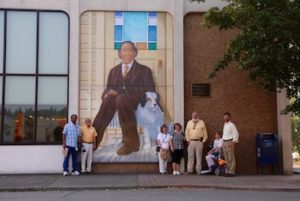
Main Street Mural
*Centralia, Washington, was founded on this date in 1886. It is a city in Lewis County, Washington, United States.
It was founded by a former Black slave named George Washington. In 1850, Washington led J. G. Cochran and his wife Anna to the area via the Oregon Trail. In 1852, Cochran filed a donation land claim near the Borst Home and was able to sell his claim to Washington for $6,000 because, unlike the neighboring Oregon Territory, there was no restriction against passing legal ownership of land to Blacks in the newly formed Washington Territory.
The family feared Washington would be forced into slavery if they stayed in Missouri after the Compromise of 1850. In the 1850s and 1860s, Centralia's Borst Home, at the confluence of the Chehalis and Skookumchuck Rivers, was the site of a toll ferry and the halfway stopping point for stagecoaches operating between Kalama, Washington, and Tacoma. Upon hearing of the imminent arrival of the Northern Pacific Railway (NP) in 1872, Washington and his wife, Mary Jane, filed a plat for the town of Centerville, naming the streets after biblical references and offering lots for $10 each, with one lot free to buyers who built houses. Washington also donated land for a city park, a cemetery, and a Baptist church.
Responding to new settlers' concern about a town in Klickitat County with the same name, the city was cited Centralia by 1883, as suggested by a recent settler from Centralia, Illinois, and officially incorporated on February 3, 1886. The town's population boomed, then collapsed in the Panic of 1893, when the NP went bankrupt; entire city blocks were offered for as little as $50 with no takers. Washington (despite facing racial prejudice from some newcomers) made personal loans and forgave debt to keep the town afloat until the economy stabilized; the city then boomed again based on the coal, lumber, and dairying industries.
The boom lasted until November 11, 1919, when the infamous Centralia Massacre occurred. Spurred on by local lumber barons, American Legionnaires (many of whom had returned from WWI to find jobs filled by pro-union members of the Industrial Workers of the World (IWW)) used the Armistice Day parade to attack the IWW hall. Marching with loaded weapons, the Legionnaires broke from the parade. They stormed the hall to bust union organizing efforts by what was seen as a Bolshevik-inspired labor movement.
Though it remains controversial about who fired first, IWW workers, including recently returned WWI veteran, Wesley Everest, stood their ground, engaging and killing four Legionnaires. Everest was captured, jailed, and then brutally lynched. Other IWW members were also jailed. The event made international headlines and, coupled with similar actions in Everett, Washington, and other lumber towns, stifled the American labor movement until the economic devastation of the 1930s Great Depression changed opinions about labor organizations.
When Washington died in 1905, all businesses in the town closed, and 5,000 mourners attended his funeral. It is located along Interstate 5 near the midpoint between Seattle and Portland, Oregon. The city had a population of 16,336 at the 2010 census. Centralia is twinned with Chehalis, located to the south near the confluence of the Chehalis and Newaukum rivers. The town's name originally referred to its location as the midway point between Tacoma and Kalama. Still, it proved to have longevity when it became the midpoint between Seattle and Portland, Oregon, and during the development of Washington's I-5 portion of the Interstate Highway System. As extractive industries faced decline, Centralia's development refocused on freeway-oriented food, lodging, retail, and tourism, as well as regional shipping and warehousing facilities, leading to a 60 percent growth in population over the past four decades.